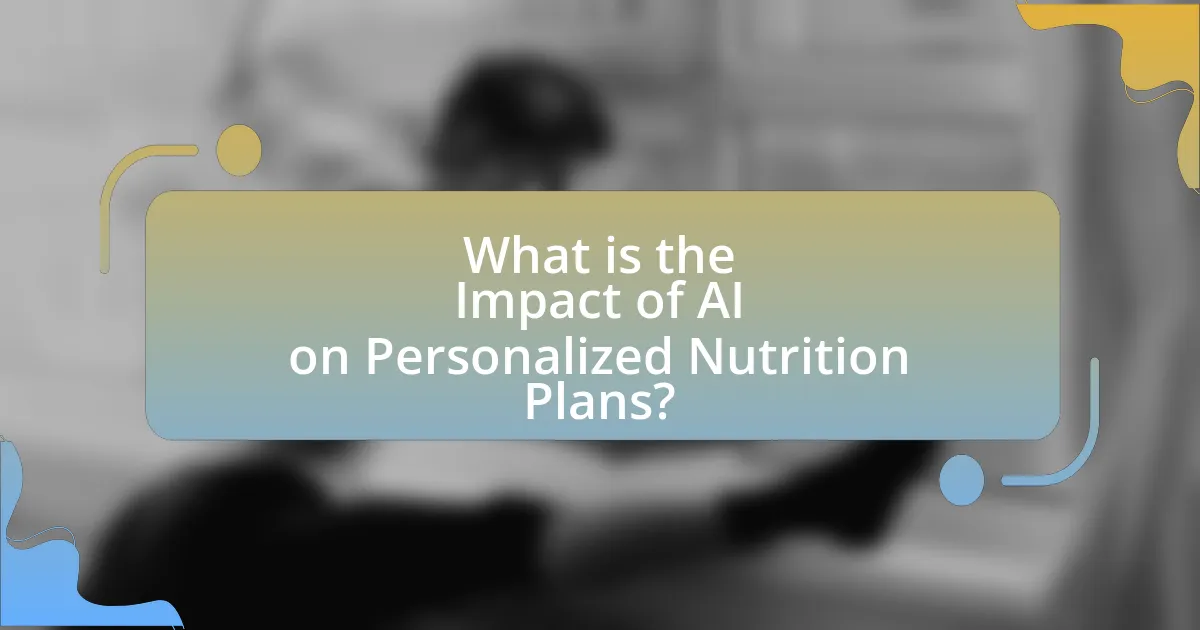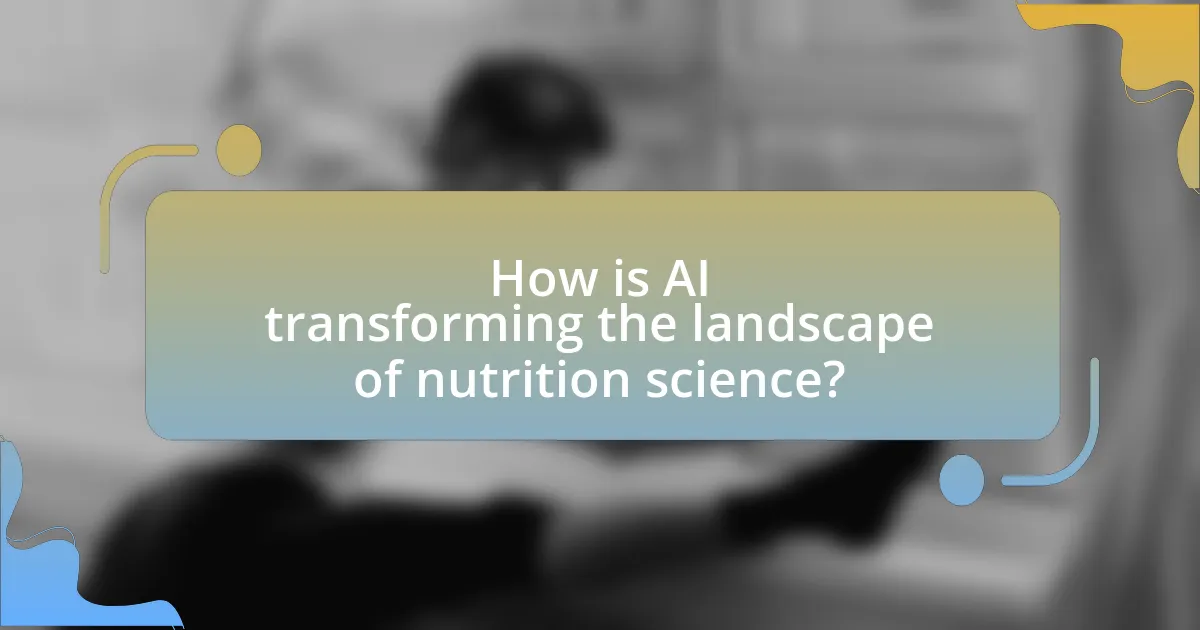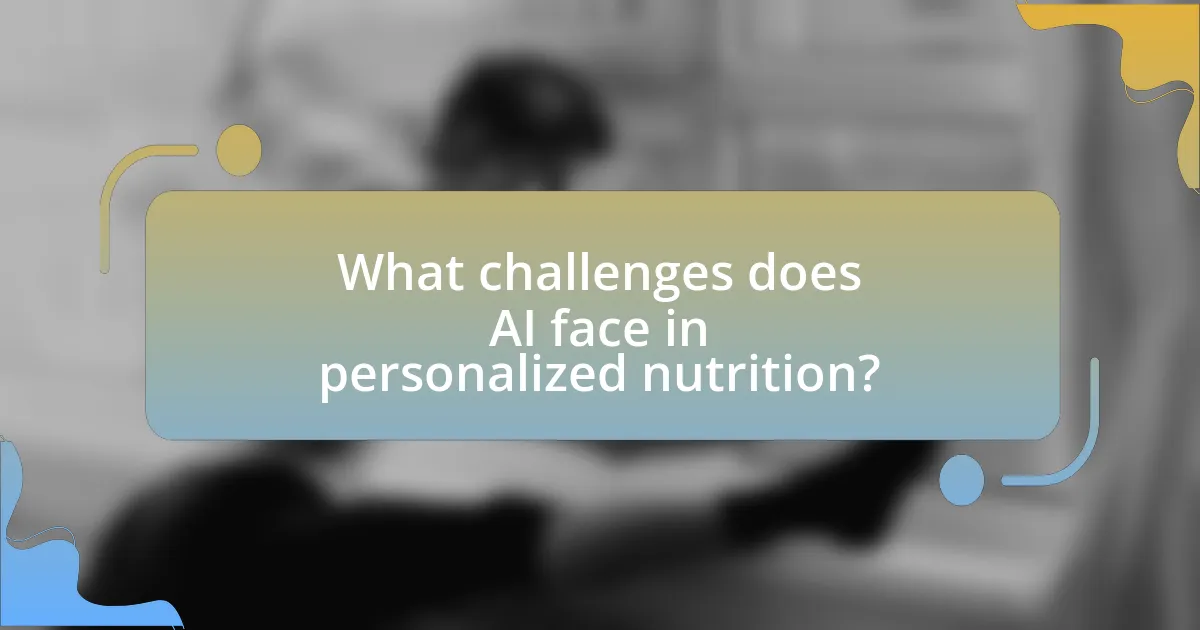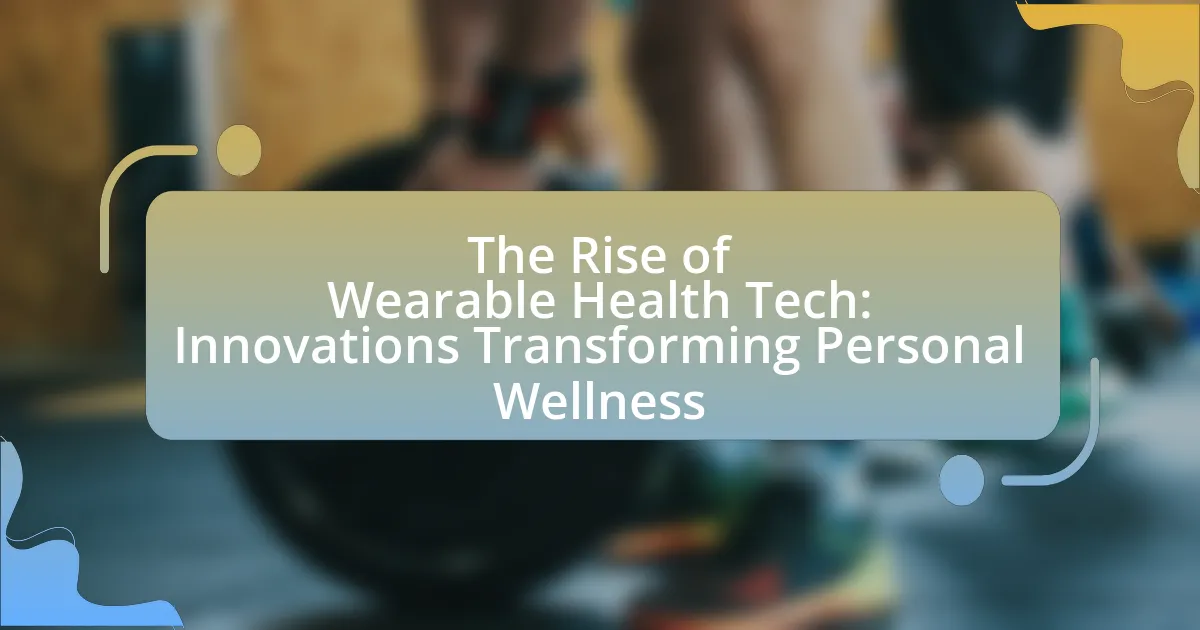The article examines the significant impact of artificial intelligence (AI) on personalized nutrition plans, highlighting how AI enables the creation of tailored dietary recommendations based on individual health data, preferences, and goals. It discusses the technologies involved, such as machine learning algorithms and data analytics, which analyze vast datasets to optimize nutrition strategies. Key benefits include improved health outcomes and enhanced user engagement, while challenges such as data privacy and algorithmic bias are also addressed. The article emphasizes the importance of accurate data collection and user feedback in refining AI-generated meal suggestions, ultimately transforming the landscape of nutrition science.

What is the Impact of AI on Personalized Nutrition Plans?
The impact of AI on personalized nutrition plans is significant, as it enables the creation of tailored dietary recommendations based on individual health data, preferences, and goals. AI algorithms analyze vast amounts of data, including genetic information, lifestyle habits, and nutritional needs, to provide customized meal plans that optimize health outcomes. For instance, a study published in the journal “Nature” demonstrated that AI-driven dietary interventions could improve metabolic health markers in individuals with obesity, showcasing the effectiveness of personalized approaches. Additionally, AI tools can continuously learn from user feedback and outcomes, refining recommendations over time to enhance adherence and effectiveness.
How does AI contribute to the development of personalized nutrition plans?
AI contributes to the development of personalized nutrition plans by analyzing individual dietary needs, preferences, and health data to create tailored recommendations. Machine learning algorithms process vast amounts of data, including genetic information, lifestyle factors, and existing health conditions, to identify optimal nutrient profiles for each person. For instance, a study published in the journal “Nature” demonstrated that AI-driven models could predict dietary responses based on genetic variations, leading to more effective nutrition strategies. This data-driven approach enhances the precision of nutrition plans, ensuring they align closely with individual health goals and dietary restrictions.
What technologies are involved in AI-driven personalized nutrition?
AI-driven personalized nutrition involves several key technologies, including machine learning algorithms, data analytics, wearable devices, and mobile applications. Machine learning algorithms analyze vast amounts of dietary data and individual health metrics to provide tailored nutrition recommendations. Data analytics processes information from various sources, such as genetic data, microbiome analysis, and lifestyle factors, to create personalized nutrition plans. Wearable devices track real-time health metrics, such as activity levels and biometrics, which inform dietary adjustments. Mobile applications facilitate user engagement by offering meal planning, tracking, and feedback based on AI insights. These technologies collectively enhance the effectiveness of personalized nutrition by leveraging data to optimize dietary choices for individual health outcomes.
How does data collection enhance AI’s effectiveness in nutrition planning?
Data collection enhances AI’s effectiveness in nutrition planning by providing comprehensive and personalized insights into individual dietary needs and preferences. By gathering data such as dietary habits, health metrics, and lifestyle factors, AI algorithms can analyze patterns and make tailored recommendations. For instance, a study published in the Journal of Nutrition found that personalized dietary interventions based on individual data led to a 20% improvement in adherence to nutrition plans. This demonstrates that effective data collection allows AI to create more accurate and relevant nutrition strategies, ultimately leading to better health outcomes.
What are the key benefits of using AI in personalized nutrition?
The key benefits of using AI in personalized nutrition include enhanced dietary recommendations, improved health outcomes, and increased engagement in nutrition management. AI analyzes individual data such as genetics, lifestyle, and health conditions to create tailored nutrition plans that optimize nutrient intake and address specific health goals. For instance, a study published in the journal “Nutrients” found that AI-driven personalized nutrition interventions led to significant improvements in metabolic health markers among participants. This demonstrates that AI not only personalizes dietary advice but also contributes to measurable health benefits.
How does AI improve dietary recommendations for individuals?
AI improves dietary recommendations for individuals by analyzing vast amounts of data to create personalized nutrition plans tailored to individual health needs and preferences. Through machine learning algorithms, AI can assess dietary habits, health conditions, and nutritional requirements, enabling it to suggest specific foods and meal plans that optimize health outcomes. For instance, a study published in the journal “Nature” demonstrated that AI-driven dietary interventions led to significant improvements in metabolic health markers among participants, showcasing the effectiveness of personalized recommendations.
What role does AI play in tracking nutritional progress?
AI plays a crucial role in tracking nutritional progress by analyzing dietary data and providing personalized insights. Through machine learning algorithms, AI can process vast amounts of nutritional information, enabling users to monitor their food intake, assess nutrient levels, and identify dietary patterns. For instance, AI-driven applications can utilize image recognition to analyze meals and calculate caloric intake, enhancing accuracy in tracking. Studies have shown that users of AI-based nutrition apps report improved adherence to dietary goals, demonstrating the effectiveness of AI in facilitating nutritional progress.

How is AI transforming the landscape of nutrition science?
AI is transforming the landscape of nutrition science by enabling personalized nutrition plans through data analysis and machine learning algorithms. These technologies analyze vast amounts of dietary data, genetic information, and individual health metrics to create tailored dietary recommendations. For instance, a study published in the journal “Nature” by researchers at Stanford University demonstrated that AI can predict individual responses to specific foods, allowing for more effective dietary interventions. This capability enhances the precision of nutrition science, moving away from one-size-fits-all approaches to more individualized strategies that consider unique biological and lifestyle factors.
What advancements in AI are influencing nutrition research?
Advancements in AI influencing nutrition research include machine learning algorithms, natural language processing, and predictive analytics. Machine learning algorithms analyze large datasets to identify patterns in dietary habits and health outcomes, enabling personalized nutrition recommendations. Natural language processing allows for the extraction of relevant information from scientific literature and dietary guidelines, enhancing the understanding of nutritional needs. Predictive analytics utilizes historical data to forecast individual responses to dietary changes, improving the effectiveness of personalized nutrition plans. These advancements are supported by studies such as “Artificial Intelligence in Nutrition Research: A Review” published in the Journal of Nutrition, which highlights the transformative role of AI in tailoring dietary interventions.
How do machine learning algorithms analyze dietary patterns?
Machine learning algorithms analyze dietary patterns by processing large datasets of food intake, nutritional information, and individual health metrics to identify trends and correlations. These algorithms utilize techniques such as clustering, classification, and regression to categorize dietary habits and predict health outcomes based on dietary choices. For instance, a study published in the journal “Nature” by researchers at Stanford University demonstrated that machine learning models could accurately predict dietary patterns and their effects on health by analyzing data from wearable devices and food diaries. This approach allows for personalized nutrition recommendations tailored to individual needs and preferences, enhancing the effectiveness of dietary interventions.
What impact does AI have on nutritional genomics?
AI significantly enhances nutritional genomics by enabling personalized dietary recommendations based on individual genetic profiles. Through machine learning algorithms, AI analyzes vast datasets of genetic information and nutritional responses, identifying correlations that inform tailored nutrition plans. For instance, a study published in the journal “Nature” by Zubair et al. (2021) demonstrated that AI-driven models could predict how specific genetic variations affect nutrient metabolism, leading to more effective dietary interventions. This capability allows for optimized health outcomes by aligning nutrition with genetic predispositions, thereby improving overall wellness and disease prevention strategies.
How does AI facilitate personalized meal planning?
AI facilitates personalized meal planning by analyzing individual dietary preferences, nutritional needs, and health goals to create tailored meal suggestions. Machine learning algorithms process data from various sources, including user input, dietary guidelines, and food databases, to recommend meals that align with specific requirements. For instance, a study published in the Journal of Nutrition found that AI-driven meal planning applications improved adherence to dietary recommendations by 30% among users. This demonstrates that AI not only customizes meal options but also enhances the likelihood of users following their nutrition plans effectively.
What factors does AI consider when creating meal plans?
AI considers several factors when creating meal plans, including individual dietary preferences, nutritional requirements, health conditions, and lifestyle factors. These elements are analyzed to tailor meal plans that meet specific needs, ensuring a balance of macronutrients and micronutrients. For instance, AI can utilize data from user inputs, such as allergies or specific dietary goals like weight loss or muscle gain, to generate suitable meal options. Additionally, AI algorithms may incorporate food availability and seasonal ingredients to enhance the practicality of the meal plans. This approach is supported by studies showing that personalized nutrition can lead to better adherence and improved health outcomes.
How does user feedback improve AI-generated meal suggestions?
User feedback enhances AI-generated meal suggestions by providing real-time data on preferences, dietary restrictions, and satisfaction levels. This information allows AI algorithms to refine their recommendations, ensuring they align more closely with individual user needs. For instance, when users indicate their enjoyment or dislike of specific meals, the AI can adjust future suggestions accordingly, leading to a more personalized experience. Studies show that incorporating user feedback can increase the accuracy of meal recommendations by up to 30%, demonstrating the significant impact of user input on the effectiveness of AI in personalized nutrition.

What challenges does AI face in personalized nutrition?
AI faces several challenges in personalized nutrition, primarily related to data quality, individual variability, and ethical considerations. The effectiveness of AI in creating tailored nutrition plans depends on the availability of high-quality, diverse datasets that accurately represent different populations. Individual variability in genetics, lifestyle, and health conditions complicates the development of universally applicable algorithms. Furthermore, ethical concerns regarding data privacy and consent arise when collecting personal health information for AI analysis. These challenges hinder the widespread adoption and reliability of AI-driven personalized nutrition solutions.
What ethical considerations arise from using AI in nutrition?
The ethical considerations arising from using AI in nutrition include data privacy, algorithmic bias, and informed consent. Data privacy concerns stem from the collection and storage of sensitive personal health information, which can be vulnerable to breaches. Algorithmic bias can lead to unequal treatment or recommendations based on flawed data sets, potentially exacerbating health disparities. Informed consent is crucial, as individuals must understand how their data will be used and the implications of AI-driven recommendations. These considerations highlight the need for transparent practices and ethical guidelines in the deployment of AI technologies in nutrition.
How does data privacy affect AI applications in personalized nutrition?
Data privacy significantly impacts AI applications in personalized nutrition by limiting the availability and use of sensitive health data necessary for creating tailored dietary recommendations. When individuals are concerned about their data privacy, they may be less willing to share personal information, such as medical history, dietary preferences, and biometric data, which are crucial for AI algorithms to generate accurate and effective nutrition plans. According to a survey by the International Association of Privacy Professionals, 79% of consumers express concerns about how their health data is used, indicating a strong demand for privacy protections. This reluctance can hinder the development and effectiveness of AI-driven personalized nutrition solutions, as the algorithms rely on comprehensive datasets to learn and improve their recommendations.
What biases can occur in AI algorithms related to nutrition?
AI algorithms related to nutrition can exhibit biases such as data bias, algorithmic bias, and confirmation bias. Data bias occurs when the training datasets used to develop these algorithms do not represent the diversity of the population, leading to skewed recommendations that may not be applicable to all demographic groups. For instance, if an AI model is trained predominantly on data from a specific ethnic group, it may fail to provide accurate nutritional advice for individuals from other backgrounds. Algorithmic bias arises from the design of the algorithms themselves, which may prioritize certain nutritional guidelines over others based on flawed assumptions or incomplete information. Confirmation bias can occur when algorithms reinforce existing beliefs or trends in dietary practices rather than challenging them with new evidence. These biases can significantly impact the effectiveness and fairness of personalized nutrition plans, potentially leading to health disparities among different populations.
How can users effectively utilize AI for their nutrition plans?
Users can effectively utilize AI for their nutrition plans by leveraging personalized meal recommendations based on dietary preferences, health goals, and nutritional needs. AI algorithms analyze individual data, such as age, weight, activity level, and health conditions, to create tailored meal plans that optimize nutrient intake. For instance, a study published in the Journal of Nutrition found that AI-driven dietary interventions improved adherence to nutritional guidelines by 30% among participants, demonstrating the effectiveness of personalized approaches. Additionally, AI applications can track food intake and provide real-time feedback, helping users make informed choices that align with their nutrition goals.
What best practices should individuals follow when using AI nutrition apps?
Individuals should ensure they input accurate and comprehensive personal data when using AI nutrition apps. Accurate data, including age, weight, dietary preferences, and health conditions, allows the app to generate tailored nutrition plans that meet individual needs. Research indicates that personalized nutrition can lead to better adherence and improved health outcomes, as seen in studies like “Personalized Nutrition: The Future of Nutrition” published in the Journal of Nutritional Science, which highlights the effectiveness of customized dietary recommendations. Additionally, users should regularly update their information to reflect any changes in lifestyle or health status, ensuring the app’s recommendations remain relevant and effective.
How can users ensure they receive accurate and personalized advice?
Users can ensure they receive accurate and personalized advice by providing comprehensive and specific information about their dietary preferences, health conditions, and lifestyle habits. This detailed input allows AI systems to analyze individual needs effectively, tailoring recommendations based on unique profiles. Research indicates that personalized nutrition plans, which consider factors such as genetics, activity levels, and personal goals, lead to better adherence and outcomes (Wang et al., 2020, “Personalized Nutrition: A Review of the Current State of the Science,” Nutrients). By actively engaging with the technology and updating their information regularly, users can enhance the precision of the advice they receive.





